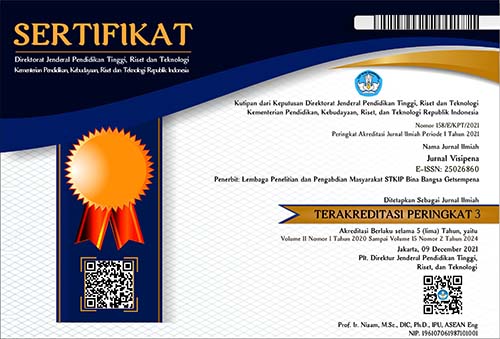MINIMIZING TRADITIONAL APPROACH IN INDONESIAN EDUCATION
Abstract
This essay discusses the traditional approach in Indonesian education from different angle; cause and effect perspective. A traditional teaching approach employs a didactic flow of knowledge from the teacher, as a sage, to the student as a receptacle (Richmond, 2007) which more emphasizes the mastery of concept, with less stress on skills improvement. The common system of traditional education is teacher centred where the teacher focuses on delivering information about some contents (Liang, 2004). Teacher-centred class instruction and rote learning are deeply embedded; this type of instruction has become a part in the Indonesian school culture and unofficial standard of practice for years (USAID 2008; Bjork 2005). Shallow level of meaning found in school science (Aikenhead 2000). There are several explanations related to these problem; the institutional culture, the Indonesian school cultures; standardized and highly centralized examinations, and less emphasize on improving their teaching ability. Due to these causes, this paper proposes 4 solutions as follows; first, detaching the teachers from their dependence on and deference to the policies and regulations of the central government’s education authorities, Second, finding other methods of teacher recruitment, third, empowering the teachers: enriching pedagogical knowledge-lesson study/action research, and prosperity, last, providing a fair system which is emphasized on teaching Standard for standardized test.
Downloads
References
Aikenhead, G.S., 2000 (draft) Renegotiating the culture of school science, Deakin University Australia. Retrieved, 3 February 2011.
Bjork, C., 2005 Indonesian Education: Teachers, Schools, and Central Bureaucracy. New York and London: Routledge.
Bjork, C., 2006 Educational Decentralization, Springer, Netherlands.
Campbell, M & Hourigan, N (2008) 'Institutional cultures and development education' in Policy & Practice: A Development Education Review, Vol. 7, Autumn 2008, pp. 35-47,
http://www.developmenteducationreview.com/issue7-focus3, retrieved on 21 February 2011
Clark, C., 1992 Teachers as designers in self-directed professional development, Teachers College Press, New York.
Hopkins, D. 2008 A teacher’s guide to the classroom research: 4th Edition, Open University Press, New York.
Kemmis, S. and McTaggart, R. 1988 The Action Research Planner, 3rd edn.
Liang, Q., 2004 A shift from traditional teacher-centred strategy to student-centred strategy in genetics teaching. The China Papers, http://sydney.edu.au/science/uniserve_science/pubs/china/vol3/CP3_B6.pdf, retrieved on 21 February 2011.
Mahyidin, M. 2011. Personal Communication with an Indonesian civil servant. At the Geelong Campus of Faculty of Art and education, Deakin University.
Richmond, 2007 Bringing critical thinking to the education of developing countries professional, International Education Journal 8(1):1-29.
Schön, DA (1983). The Reflective Practitioner: How Professionals Think in Action. New York: Basic Books.
Syahril, I., 2007 Standardized testing in Indonesian secondary education: An analysis on the impact of national exit exam (2005-2007), http://pocketknowledge.tc.columbia.edu/home.php/viewfile/38608, retrieved 04 February 2010.
USAID, 2008 Decentralized Basic Education Three (DBE3): The current situation of formal education at junior secondary school level in Indonesia, www.usaid.gov, retrieved 04 February 2011. VCA, 2011, Victorian Certificate of Education (VCE), http://www.vcaa.vic.edu.au/vce/, retrieved 04 February 2011.
Wrag, E.C. 1999 An introduction to classroom observation: 2nd Edition, Routledge, London.
Zulfiqar, T., 2009 The Making of Indonesian Education: An Overview on Empowering Indonesian Teachers




















